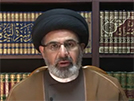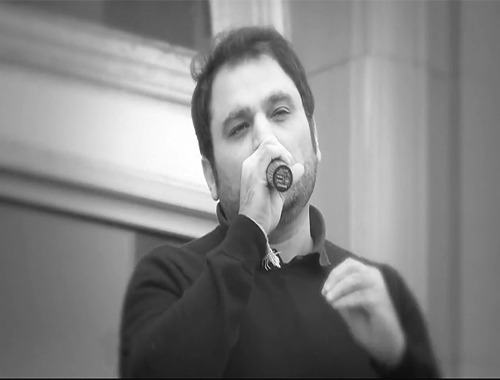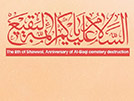3-Islamic Moral Qualities, Ethics and Ideals
- Details
- Hits: 4164
3-ISLAMIC MORAL QUALITIES, ETHICS AND IDEALS
Question:
What are moral qualities or traits?
Answer:
They are of two kinds: those relating to the heart; those relating to parts of the body and the limbs.
Question:
Please provide examples for each kind.
Answer:
Moral traits relating to the heart are, for instance, tenderness of heart or, conversely, jealousy, and examples of traits relating to parts of the body are truthfulness or lying.
Question:
Moral qualities, as a whole, may be divided into how many kinds?
Answer:
They can be divided, on the whole, into two kinds:
1. Good moral traits, or virtues, whose presence in man is commendable.
2. Bad moral traits, or vices, whose presence in man is found repulsive.
Question:
What is man’s responsibility as regards moral principles?
Answer:
Man is charged with adorning himself with “virtues” and avoiding vices, for virtues are perfection and vices are a deficiency. Man by nature seeks perfection and distances himself from defects.
Question:
Is it possible for man to adorn himself with virtues and keep away from vices?
Answer:
Yes, this is possible, for man’s soul is like a white sheet of paper which is receptable to any colour. The only thing is that it is difficult to be in command of one's soul which needs to be made tractable and, particularly with regard to acquiring virtues, it requires continuous vigilance until the praiseworthy quality becomes inherent in one’s nature. When such a quality becomes fixed within a person’s soul, he or she cannot help but do good and does so without any hardship
The soul, when it comes to ethics, is similar to man when he wants to learn or make things. A man needs to learn and apply continually his knowledge in order to become an artisan who almost automatically and without difficulty can perform his job. In the same way man can acquire virtues
Question:
Give an example of this.
Answer:
If someone wants to be truthful he should tirelessly make an effort to speak nothing but the truth, and should do this time and time again until truthfulness becomes a part of his nature. The same applies to other qualities especially the most commendable which are more of a trial for the soul of man.
Question:
How does Islam regard having moral principles?
Answer:
Islam incessantly orders people to acquire virtues and forbids them from doing base deeds
Question:
What is to be gained from tiring oneself to acquire virtues and of keeping away from bad things?
Answer:
Virtues and good deeds benefit both the individual and society, as opposed to base things which harm equally the individual and society. For example, activity, which is in itself a virtue, makes man progress and strive harder and at the same time encourages society to develop more, whereas stagnation and laziness harm both man and society. Such is the case with all the virtues and vices.
Question:
Some say that ethical principles reflect a society divided by class. Is this true?
Answer:
Not at all. Let us ask this group whether justice in the application of the law is a mere reflection of a particular society and so if the attitudes of that society were to change, injustice would become an admired quality? And is treason against the state such that if a different kind of society came about, treason would be counted lawful? A similar argument can be applied to all the other virtues.
Virtue will always be virtue and baseness will always be baseness and this is irrespective of how society is at a particular time or how it changes.
Question:
What are good moral traits?
Answer:
There are many good moral traits. We will here mention some of them:
1-Honesty in Word and Deed:
Man should be truthful in what he says and should be honest in what he does, in that his actions do not contradict what he really believes as in the case of a person who, out of outward show or flattery, is respectful to another although in his heart he thinks otherwise. Man should also be sincere in his actions. This means that he should not give the impression that he is intent on doing a particular thing whereas he really wants to do something else. He should also keep his promises and never break his word. He should avoid pretence and not make himself out to be something that he is not, like someone, for instance, who wears tattered clothes so that people will think that he is poor whereas in reality he is well-off.
2-Trustworthiness in Speech and Character:
Man should be sincere with his Lord and should not offend Him on any account. He should be honest in his dealings with others and not cheat anyone and should be trustworthy with regard to things that belong to other people and never betray their trust. He should act honourably concerning the reputation of another and never do anything God has forbidden behind his back.
The importance of these two virtues, truthfulness and trustworthiness have been emphasized in hadith transmitted from the Holy Prophet and his pure progeny to the extent that one of the traditions relates that, “Every prophet sent by God was truthful in what he said and trustworthy in his dealings".[2] Indeed an honest and trustworthy man is loved by others and by God and is successful in what he does, in contrast to a liar and one who cannot be trusted who wrecks his future even though he may benefit from some brief gain in the short term.
3-Courage:
Man should be courageous and intrepid, and in his affairs should not let fear near him, for the coward is always at the end of the line. Every prophet and reformer possessed this quality and this is enough to show how desirable it is. They could otherwise never have been able to change society from being a corrupt one to being righteous and lead it from decadence onto the path of upward development, since to confront people with what they do not want to hear even though it is for their own good requires the strongest kind of courage.
4-Generosity:
In society there are always poor and needy people, and there are always schemes which need help. [Those who give generously] are the mainstays of society upon whom the disadvantaged pin their hopes. Therefore man should be generous and give liberally. If the generous person is rich, his generosity will not be a cause of loss for him, and if he should be of average means his smaller contribution will also be accepted. According to the popular saying, “The best generosity is to give whatever you can”. The poet says:
If the world has favoured you dispense of its bounty
to others before it slips from your grasp,
If this bounty is coming your way generosity will not destroy it
and if this bounty is leaving you, miserliness will not hold it back
5-A Sense of Honour:
Honour is a condition in man by means of which he protects those things which should be protected and guarded like religion, country, reputation and so on and is one of the virtues. If an individual or community cease to have honour their very nature comes under threat.
Of course teachers of ethics have talked in detail about those things which are a matter of honour, as well as those things in which it would be harmful if a sense of honour were applied but that is outside the scope of this book.
6-Cooperation in Good Works:
Life is not shaped by the individual but, on the contrary, by individuals cooperating together. The greater this cooperation and mutual assistance, the more life will get better and the more society will progress. Cooperation is of various kinds: through intellectual endeavour, through money, work, and the various ways of cooperating as a community.
7-Effort and Joy:
Man loves pleasures and comfort which are the enemies of progress and advancement and cause laziness, indolence, backwardness and decline. Therefore effort and activity have become indispensable for mankind. Activity is incumbent upon mankind since it is a quality which moves him forward in all aspects of life. Anyone who is not active and does not make an effort will undoubtedly remain backward. Similarly, any nation which does not possess this quality is on the road to decline.
8-Organization:
Imam Amir al-Mu’minin (peace be upon him) says “By God I exhort you to organize your affairs". [3]
Man’s time is very scarce and the duties and responsibilities that he has in relation to himself, society, his future in this world and the afterlife are numerous. Therefore he should organize his tasks carefully and meticulously.
In this respect he should take an example from the phenomena of the universe. Everything has a special system otherwise the universe would be chaotic. Similarly if a government or administration does not have a system or division of work responsibilities, society will fall into disarray.
9-Reform:
The world whether it likes it or not tends towards disorder. Time makes every new thing obsolete and destroys eventually anything that has been built. Tyrants corrupt nations and treat the people like slaves. Therefore, man must rise like a reformer and, according to his ability, make the world a better place to live in, make people more civilized, improve society by introducing into it ways by which it can progress and go forward, and reform conditions which have got out of order or been corrupted by the oppressors.
10-Cleanliness:
The Holy Prophet (God’s blessings and peace be upon him and his progeny) says, "cleanliness is a part of faith".
· Cleanliness is of four kinds:
· Cleanliness in speech, which means that man’s speech should be free of idle talk, meaningless utterances, gossip, lies, poking fun at people and so forth.
· Cleanliness in character, that is not doing bad and nasty things.
· Cleanliness in every part of the body, which is fulfilled by washing thoroughly, removing dirt and grime, and by using perfumes.
· Cleanliness in one's clothes and in one's food and drink and so on.
11- Moderation:
Man should be moderate in all his affairs. For excess and over-indulgence cause fatigue and, consequently, destruction. Wastage creates backwardness and decadence. God, in the Qur’an, states:
“Thus we have made you a moderate nation”[2: 143]. For example, if the safest speed for a a car is 100 kms per hour, then the speed of 150 kms per hour is excessive and the speed of 50 kms per hour is too little.
12-Justice:
In all his dealings man must be just whether they are personal, family or social, whether he is a judge or ruling a country or anything else. In the heart of every man, God Almighty has placed a yardstick by which he can distinguish justice from injustice. Justice is one of the greatest virtues and personal qualities by means of which man can reach the highest levels of spirituality.
13-Prudence:
By this quality man can organize affairs according to wisdom and correctness, paying careful attention to matters that concern him personally: giving and receiving, bringing up his children, getting on with people, and, if he is the manager of a business or the like, how best to run it; similarly in all his affairs, whether they be personal or affect society as a whole, whether they be religious or worldly and so on.
14-Affability and Amiable Conduct:
This means he speaks to others kindly and maintains a pleasant countenance whether they be his family or relatives, neighbours, his colleagues at work or anyone else. He should try to acquire the friendship of others through the interchange of visits and gifts, by participating in the happiness and sorrows of other people, by forgiving anyone who does him a wrong and by apologizing to anyone he may have offended.
15-Piety:
Man should fear God in all circumstances and in everything he does. He should not do anything which displeases God Almighty for he will not remain forever in this world. He will die and afterwards if he has done good he will receive a good reward but if has done bad he will be duly punished
In addition to this, piety is one of the best ways by which both the individual and society will prosper in this world.
16-Knowledge:
Not, however, just a little knowledge: on the contrary, just as the Holy Prophet of Islam has stated, “Seek knowledge from the cradle to the grave”. It is through knowledge that God Almighty raises the status of a human being in His sight for as He himself states in the Qur’an: “Allah will exalt those of you who believe, and those who are given knowledge, in high degrees”[58: 11].
Amir al-Mu’minin ‘Ali (peace be upon him) also says: “The worth of a person is what he knows”[4].
17-Fondness and Friendship:
Man has been created a social being and so the more his friendship with his fellow creatures increases, the more his own hidden merits and those of the community where he lives become apparent, and this is always perceived whenever a man loves other human beings and when people get on with each other in a spirit of friendship. Therefore we read in the hadith: “A believer is someone who is fond of others and so others become fond of him, and there is nothing praiseworthy to say about a person who is not affectionate towards others and so he himself is not the recipient of affection". [5]
18-High-mindedness:
It has always been high-aiming aspirations, which have raised man to the ranks of the great ones.
The poet in praise of the Prophet (God’s blessings and peace be upon him and his progeny) says:
He has aspirations the greatest of which there is no limit to it,
and whose smallest one is more sublime than time itself.
19-Perseverance:
Man is perpetually confronted with problems, particularly if he strives for progress desiring advancement for society and wishing to work for the common good. So if he defies misfortune and continues in his work he will succeed but if he does not, he will be counted among the losers. As God states: “Verily, those who say, ‘Our Lord is Allah’, and then they stand fast, on them the angels will descend [saying], ‘Fear not, nor grieve’……..”[41: 30].
20-Adherence to the Highest Standards in the Treatment of Others:
Such as, possessing humility, which is not being proud; having no arrogance; possessing forbearance and not flying into a rage. Also having patience and not being easily irritated; doing good for other people and not hesitating from being a service to others, and so on.
There are many other virtues that scholars of ethics have mentioned in more detail in their books and which contain a greater number of verses from the Qur’an and hadith of the Holy Prophet and the pure Imams.











